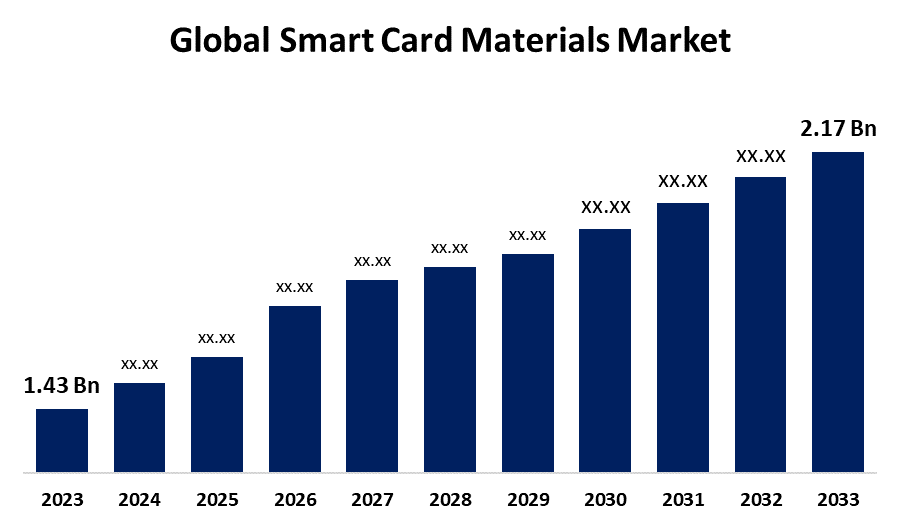Global Smart Card Materials Market Size To Worth USD 2.17 Billion By 2033 | CAGR of 4.25%
Category: Food & BeveragesGlobal Smart Card Materials Market Size To Worth USD 2.17 Billion By 2033
According to a research report published by Spherical Insights & Consulting, the Global Smart Card Materials Market Size is to Grow from USD 1.43 Billion in 2023 to USD 2.17 Billion by 2033, at a Compound Annual Growth Rate (CAGR) of 4.25% during the projected period.

Get more details on this report -
Browse key industry insights spread across 233 pages with 110 Market data tables and figures & charts from the report on the "Global Smart Card Materials Market Size, Share, and COVID-19 Impact Analysis, By Material (Polyvinyl Chloride (PVC), Polycarbonate (PC), Acrylonitrile Butadiene Styrene (ABS), Polyethylene Terephthalate-Glycol (PETG), and Others), By Type (Contact Cards, Contactless Cards, and Multi-Component Cards), By Application (BFSI, Government, Telecommunication, Retail, Healthcare, Hospitality, and Others), and By Region (North America, Europe, Asia-Pacific, Latin America, Middle East, and Africa), Analysis and Forecast 2023 – 2033 ." Get Detailed Report Description Here:https://www.sphericalinsights.com/reports/smart-card-materials-market
A smart card is a plastic chip card with an embedded computer chip a microprocessor or a memory chip that stores and processes data. Typically, this data is linked to information and value, or both, that is processed and stored on the chip. Smart card materials are the specific materials used in the manufacturing of smart cards. Smart cards are plastic cards that have integrated circuits on them that can process and store data. Transactions, identity verification, and authentication are common uses for these cards. Materials used in smart cards include substrates such as PVC or polycarbonate, conductive inks, magnetic stripes, contactless antennae, and protective coatings. These parts are necessary to ensure the durability, security, and effectiveness of smart cards. Furthermore, through the use of modern technologies such as blockchain, businesses might develop apps that help them comply with strict security requirements. Blockchain applications can make transactions fast and secure since smart cards allow for storing cryptographic keys securely. Cryptographic vault keys are stored on smart cards. When POS scanners connect these smart cards to the internet, the key-matching process begins. This process makes a comparison between the keys stored in smart cards and online libraries. Furthermore, when the cryptographic keys correctly match, users are granted authorization. By using this strategy, financial organizations can strengthen user authentication and identity protection, which will ultimately reduce the possibility of cyber theft. Also, as manufacturers become more conscious of the need to provide eco-friendly and sustainable products, the industry will rise faster in the years to come. However, smart card production includes huge capital expenditures for production tools, supplies, and technology. This could restrain new competitors from entering the market and restrict its expansion.
The polyethylene terephthalate-glycol (PETG) segment is anticipated to hold the greatest share of the global smart card materials market during the projected timeframe.
Based on the material, the global smart card materials market is divided into polyvinyl chloride (PVC), polycarbonate (PC), acrylonitrile butadiene styrene (ABS), polyethylene terephthalate-glycol (PETG), and others. Among these, the polyethylene terephthalate-glycol (PETG) segment is anticipated to hold the greatest share of the global smart card materials market during the projected timeframe. It is an exceptional material for creating smart cards due to its remarkable properties, including formability, durability, and chemical resistance. The fact that it is completely recyclable adds to its already excellent environmental credentials. Polyethylene terephthalate-glycol is an essential part of this approach, which is pushed by the need to utilize sustainable materials for smart card production worldwide.
The contact cards segment is anticipated to grow at the fastest pace in the global smart card materials market during the projected timeframe.
Based on the type, the global smart card materials market is classified into contact cards, contactless cards, and multi-component cards. Among these, the contact cards segment is anticipated to grow at the fastest pace in the global smart card materials market during the projected timeframe. This feature reduces transaction times and accelerates processing. This smart card is consequently expected to be widely utilized in several industries, including BFSI, retail, healthcare, and telecommunication. Contact cards must be inserted into card acceptor devices for payments to be completed. Pins attached to this reader make contact with pads on the surface of the card to read and save the data from the chip.
The telecommunication segment is anticipated for the largest revenue share in the smart card materials market during the estimated period.
Based on the application, the global smart card materials market is segmented into BFSI, government, telecommunication, retail, healthcare, hospitality, and others. Among these, the telecommunication segment is anticipated for the largest revenue share in the smart card materials market during the estimated period. The telecom sector is one of those that is positively influencing the market since more SIM cards are being sold. Sales of smartphones have increased over the past several years as a result of the expansion of digital marketing in various countries. The market for smart card materials will grow more quickly as smartphones become more widespread and more SIM cards are needed. Due in large part to the high-level security characteristics of smart cards, the market is expected to expand throughout the projected period. This demand is expected to come from the banking, financial services, and insurance industries.
Asia Pacific is expected to hold the largest share of the global smart card materials market over the forecast period.

Get more details on this report -
Asia Pacific is expected to hold the largest share of the global smart card materials market over the forecast period. The region's growth is estimated to be driven by the rapid digitalization and rising need for connections in developing nations such as China and India. The demand for additional SIM card uses has increased due to China's digital revolution, which will boost the market for smart card materials in the upcoming years. More SIM cards will be needed due to the Asia-Pacific region's rapid digitalization, which will propel the market for smart card materials to expand over the next several years.
North America is predicted to grow at the fastest pace in the global smart card materials market during the projected timeframe. The trend toward digitalization and the increasing use of smart card technology across a range of industries have driven growth in the North American market across several industries, including finance, healthcare, government, and more. Policymakers in the regional government are actively searching for ways to increase the efficiency of information systems used in the healthcare industry. There has been a lot of focus on the development of efficient record-sharing systems at all operational levels and the widespread use of electronic health records by all citizens.
Major vendors in the Global Smart Card Materials Market include Eastman Chemical Company, SK Chemicals, PetroChina Company Limited, Solvay S.A., Axiall Corporation, KEM One, SABIC Innovative Plastics, 3A Composites GmbH, Teijin Ltd., LG Chemicals, Formosa Plastics Group, BASF SE, and Others.
Recent Developments
- In May 2022, Eastman Chemical Company announced an ASR deal with Mizuho Markets Worldwide LLC and Wells Fargo, NA. With this acquisition, Eastman will have made significant strides toward its objective of repeat purchases upwards of $1 billion of shares by 2022, with roughly $750 million done in the 2nd period.
Key Target Audience
- Market Players
- Investors
- End-users
- Government Authorities
- Consulting And Research Firm
- Venture capitalists
- Value-Added Resellers (VARs)
Market Segment
This study forecasts revenue at global, regional, and country levels from 2020 to 2033. Spherical Insights has segmented the Global Smart Card Materials Market based on the below-mentioned segments:
Global Smart Card Materials Market, By Material
- Polyvinyl Chloride (PVC)
- Polycarbonate (PC)
- Acrylonitrile Butadiene Styrene (ABS)
- Polyethylene Terephthalate-Glycol (PETG)
- Others
Global Smart Card Materials Market, By Type
- Contact Cards
- Contactless Cards
- Multi-Component Cards
- Others
Global Smart Card Materials Market, By Application
- BFSI
- Government
- Telecommunication
- Retail
- Healthcare
- Hospitality
- Others
Global Smart Card Materials Market, Regional Analysis
- North America
- US
- Canada
- Mexico
- Europe
- Germany
- Uk
- France
- Italy
- Spain
- Russia
- Rest of Europe
- Asia Pacific
- China
- Japan
- India
- South Korea
- Australia
- Rest of Asia Pacific
- South America
- Brazil
- Argentina
- Rest of South America
- Middle East & Africa
- UAE
- Saudi Arabia
- Qatar
- South Africa
- Rest of the Middle East & Africa
About the Spherical Insights & Consulting
Spherical Insights & Consulting is a market research and consulting firm which provides actionable market research study, quantitative forecasting and trends analysis provides forward-looking insight especially designed for decision makers and aids ROI.
Which is catering to different industry such as financial sectors, industrial sectors, government organizations, universities, non-profits and corporations. The company's mission is to work with businesses to achieve business objectives and maintain strategic improvements.
CONTACT US:
For More Information on Your Target Market, Please Contact Us Below:
Phone: +1 303 800 4326 (the U.S.)
Phone: +91 90289 24100 (APAC)
Email: inquiry@sphericalinsights.com, sales@sphericalinsights.com
Contact Us: https://www.sphericalinsights.com/contact-us
Need help to buy this report?